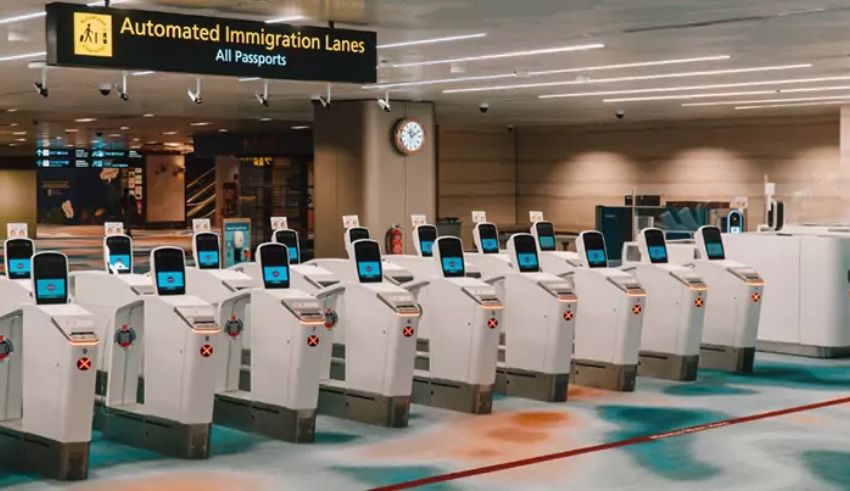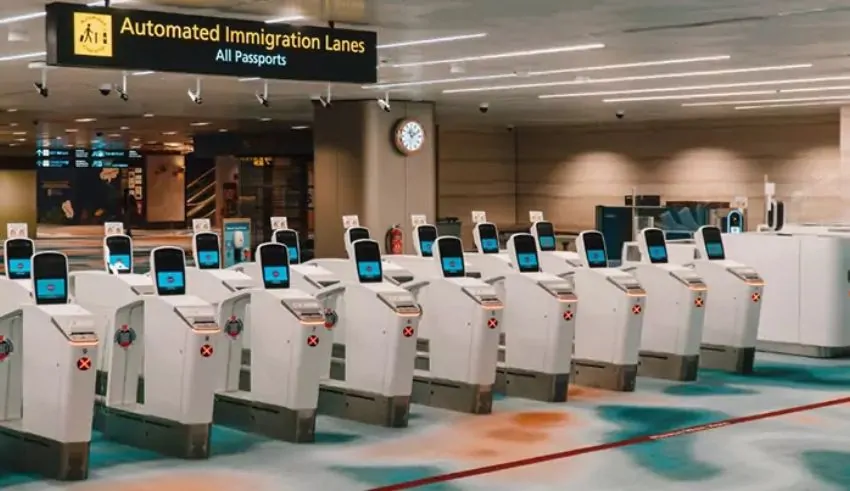

(C) Singapore
Changi Airport in Singapore, well-known globally for its innovation and efficiency, has totally adopted a passport-free clearing system across all four terminals since September 30, 2023. This biometric-based method marks a sea change in Singapore’s attempts to raise the world-class airport operations. Emphasizing the program’s overall performance, the Immigration and Checkpoints Authority (ICA) found that, as of October 15, roughly 1.5 million travelers have completed immigration without showing a physical passport.
The foundation of the new system is a startling 60% reduction in clearance time. Instead of 25 seconds, travelers today average only 10 seconds for clearance. Underlining the great impact of this technical breakthrough, Senior Assistant Commissioner Alan Koo, commander of ICA’s airport operations, “With automated clearance running the norm at our checkpoints, our officers are now redeployed to take on higher-value roles such interviewing and profiling, which helps to further safeguarding Singapore’s borders,” Koo said.
Apart from improving the travel experience, the shortened clearing time represents a purposeful adjustment in resource allocation. Originally largely concerned with manual processing, ICA staff are now ready to handle more challenging tasks, such as analyzing higher-risk individuals, therefore strengthening the general security system at one of the busiest transit hubs globally.
Md Firdaus Rosli, a Travel Checkpoint Inspector, has directly experienced the sluggish technological evolution of the airport having served with ICA for 17 years. Previously entirely manual, immigration clearance resulted in huge queues and wait times that may become intolerable for officials as well as travelers. “Seeing those long lines was stressful for both officials and passengers,” CI Firdaus remarked. ” Now, the time has been greatly shortened with the new clearance system.”
Currently working as an assessment and investigation officer, Firdaus focuses on spotting passengers of interest and interviewing individuals before allowing immigration clearance in line with modern technologies. The efficiency of the automated system has allowed him and his colleagues to focus on more critical tasks. According to him, the new technology enables foreign guests to overcome language barriers since the machines have many language options including Mandarin and Bahasa Indonesia.
The passport-free system detects passengers and allows clearance depending on facial and iris identification using state-of- the-art biometric technologies. Roll-out of this contactless technology for all Singaporeans, permanent residents, long-term pass holders for both arrivals and departures ICA has made clear, meanwhile, that tourists still need to pack their passports since some countries may require them for immigration clearance.
Right now, children under six are not included into the system as their biometrics and physical features are still developing and might not be a good basis for identification. Still, all international visitors departing Singapore can now use the biometric system since their biometric traits will have been noted upon arrival.
While the system aims to simplify travel, the ICA has stressed the requirement of travelers carrying passports even if they are visiting locations where traditional clearance processes are still in use.
Regular users have praised the faster speed and more convenience of the new approach. First employing the method in August, Eric Taufan is a mergers and acquisitions consultant. Actually, it’s fairly cool. Traveling a lot and having no issues with the new biometric clearance system over the previous two weeks, Taufan wishes other countries, especially in the region, to use the technique.
October witnessed first usage of the device by British native Andy Bingham, 61-year-old director of an energy company living in Singapore. Finding it quick and simple, he stated, “I don’t want to say negative things about other people’s passport systems, but I’ve been to some places where you put your passport in, and the machine doesn’t even recognise it.” This approach brings much more dependability.
The success of the passport-free system guides Changi Airport’s development plans. ICA said the system will be deployed at the Marina Bay Cruise Centre in December 2023, therefore benefiting guests arriving by boat. This initiative underlines Singapore’s commitment to streamlining its border control policies at many ports of access, therefore supporting its leadership in travel innovation.
Like Changi Airport, the Marina Bay Cruise Centre handles a lot of cruise bookings annually and the inclusion of biometric technology is expected to improve lines and clearing times. This development may allow the application of passport-free technology at other land and marine checkpoints, therefore enabling a completely integrated immigration experience across Singapore’s borders.
Apart from providing easier access, the passport-free clearance system is the major security enhancement. By providing a very high degree of precision in passenger identification, the biometric technology reduces the possible human error during the clearance process. This is particularly important in the global travel scene as the surroundings define the security challenges.
The ability of ICA officers to focus on higher-value tasks such as profiling and investigation adds still another level of security. Police might now spend more time identifying potential security risks instead of wallowing in manual inspections, therefore ensuring that Singapore’s borders remain safe without compromising the speed of access.
As Singapore continues to push the envelope in travel technology, its passport-free policy can motivate airports all around. Other nations eager to change their own immigration laws have already shown interest in the idea, particularly in areas where biometric technology is beginning to gather steam.
The quick acceptance of this technology at Changi Airport could inspire other countries—especially in crowded airports—to consider similar solutions. Governments and airport authorities all around Singapore’s system are most certainly under close scrutiny given the worldwide demand for faster, more efficient travel choices.
The ICA’s biometric clearance system provides a boost in airport efficiency as well as a glimpse of the future of aviation travel. Including facial and iris identification will help Singapore pave the road for a period when travel will be faster, more safe, and gradually automated. This project enables Singapore to maintain leadership in airport technology and management globally.
As plans for further development take shape and new ideas keep emerging, the passport-free system is expected to be rather crucial in guiding the course of international travel. By reducing clearing times and increasing security, Singapore is setting a new global norm for border control efficiency, therefore enhancing the complete travel experience at one of the most prestigious airports.
Cebu Pacific celebrates the delivery of its very first aircraft for 2025, the 459-seat Airbus A330neo, delivered at Ninoy Aquino…
March 29, 2025, will deliver the first solar eclipse of the year when observers from numerous continents can witness this…
Chinese President Xi Jinping invited 40 foreign business executives to Beijing on Friday to boost investor confidence and restore stable…
Thailand is set to host Group B of the AFC Women’s Asian Cup 2026 Qualifiers where India, Mongolia, Timor Leste…
The unveiling of an instrument that may symbolize a step toward updating the country’s financial identity is the celebration of…
Big investment company KKR is close to finishing its purchase of Japanese medical equipment manufacturer Topcon as private equity firms…
This website uses cookies.
Read More